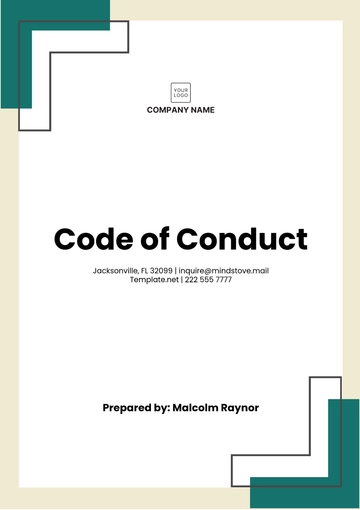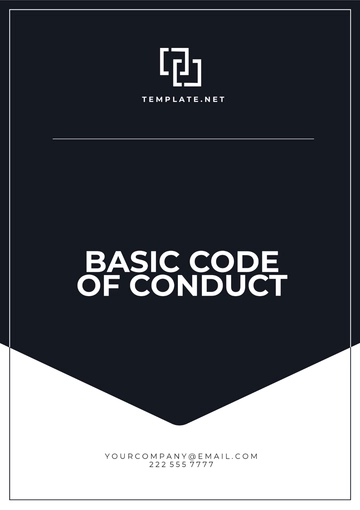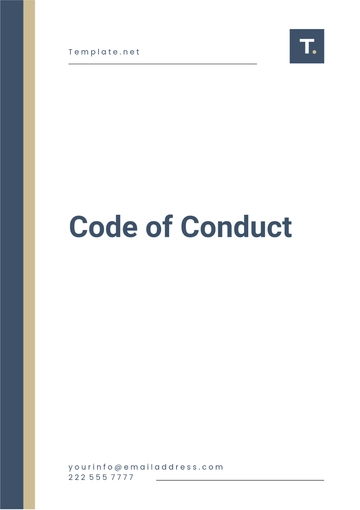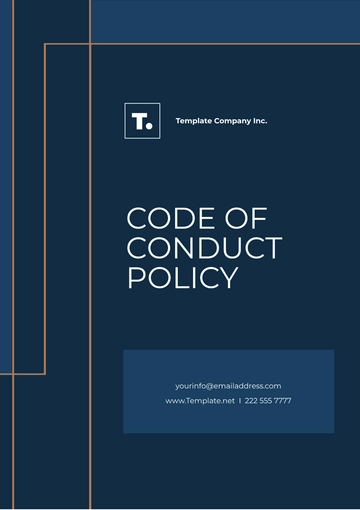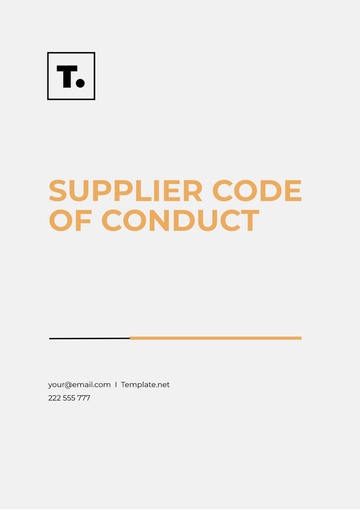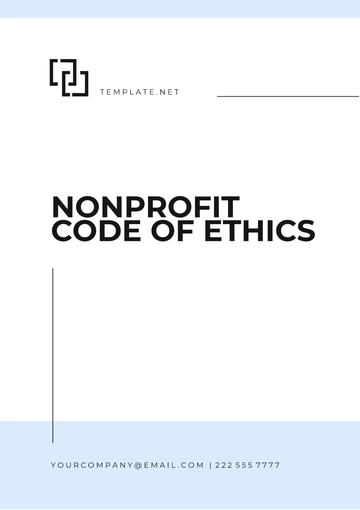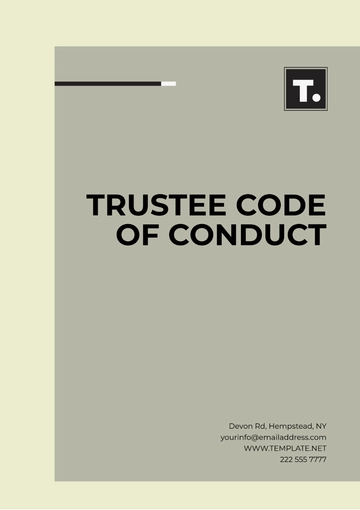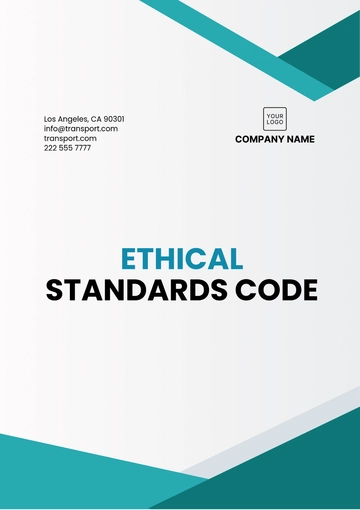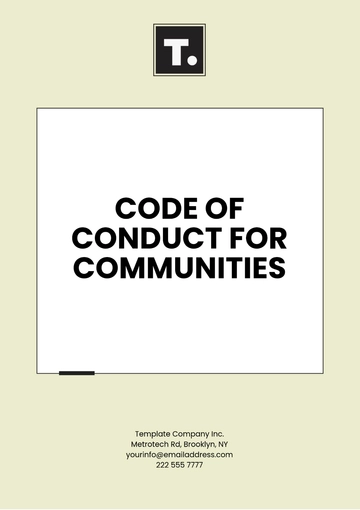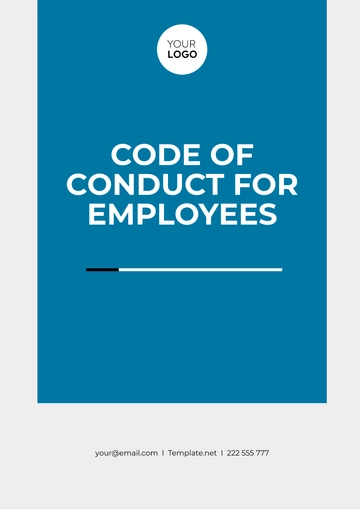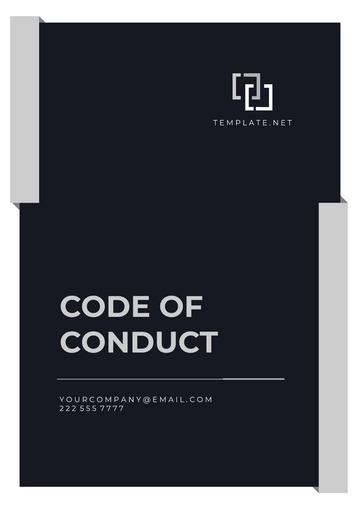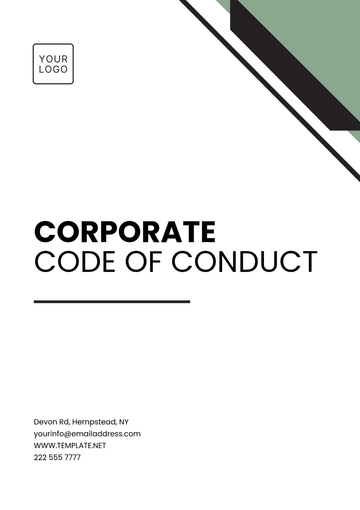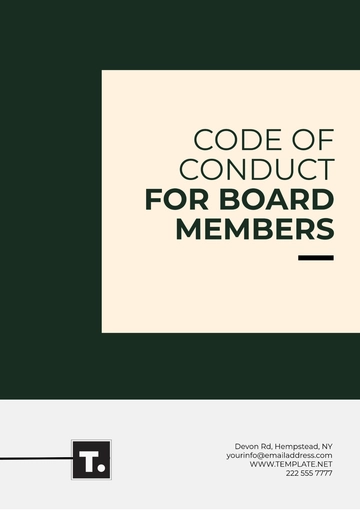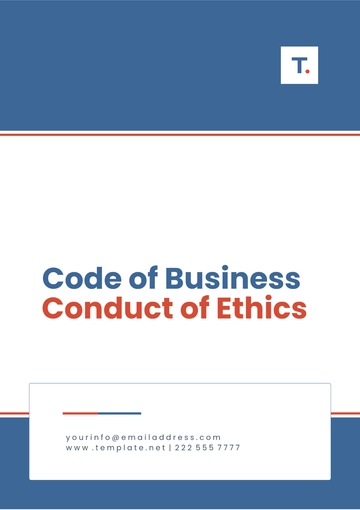Free Trustee Code of Conduct
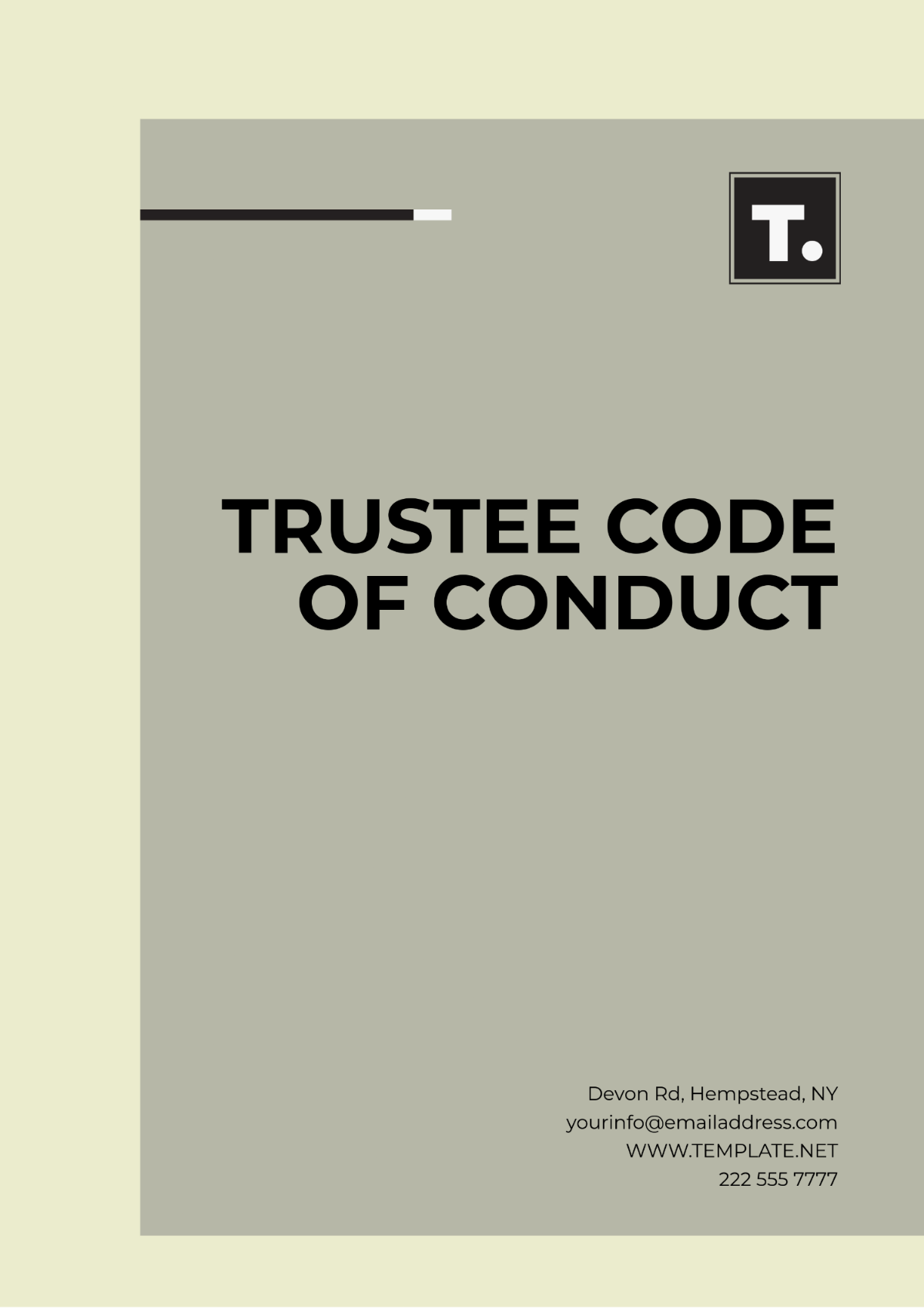
I. Introduction
[Your Company Name] is committed to upholding the highest ethical standards, promoting transparency, and fostering accountability in all aspects of its operations. As trustees, you play a crucial role in guiding the organization towards its mission and ensuring its continued success. This Trustee Code of Conduct outlines the ethical standards, responsibilities, and expected behaviors for trustees within [Your Company Name]. It serves as a guide for trustees to uphold integrity, transparency, and accountability in their decision-making and actions.
II. Duties and Responsibilities
A. Fiduciary Duty
Trustees of the company are entrusted with fiduciary responsibilities to act in the best interests of the organization and its stakeholders. This includes exercising prudence, diligence, and care in all financial matters, and avoiding conflicts of interest that may compromise the organization's mission or objectives.
B. Governance
Trustees are responsible for overseeing the governance of the company, including setting strategic direction, establishing policies, and monitoring organizational performance. Trustees should actively participate in board meetings, committees, and other relevant activities, and contribute their expertise to support the organization's mission and goals.
III. Ethical Standards
A. Integrity:
Trustees of the company are expected to act with honesty, integrity, and fairness in all their dealings on behalf of the organization. This includes avoiding deceptive practices, conflicts of interest, or any behavior that may damage the reputation or credibility of the organization.
B. Confidentiality
Trustees must respect the confidentiality of sensitive information acquired through their role and refrain from disclosing confidential information without proper authorization. This includes respecting the privacy of individuals associated with the organization and maintaining the confidentiality of board discussions and deliberations.
IV. Conduct and Behavior
A. Professionalism:
Trustees are expected to conduct themselves professionally at all times, treating fellow trustees, staff, volunteers, and stakeholders with respect, dignity, and courtesy. This includes communicating effectively, listening attentively, and fostering a culture of collaboration and mutual respect within the organization.
B. Compliance:
Trustees must comply with all applicable laws, regulations, and policies governing the operations of the company, including but not limited to, laws related to nonprofit governance, tax-exempt status, and ethical conduct. Trustees should stay informed about legal and regulatory requirements relevant to their role and seek guidance when necessary to ensure compliance.
V. Accountability
A. Transparency
Trustees are accountable for their actions and decisions as stewards of the company. Trustees should strive to promote transparency in all aspects of the organization's operations, including financial reporting, governance practices, and decision-making processes, to build trust and confidence among stakeholders.
B. Evaluation and Improvement:
Trustees should regularly evaluate their performance and the effectiveness of the board in fulfilling its duties and responsibilities. This includes participating in board self-assessments, seeking feedback from stakeholders, and identifying opportunities for continuous improvement to enhance the governance and impact of the company.
VI. Conflict of Interest
A. Disclosure:
Trustees must promptly disclose any conflicts of interest that may arise between their personal, professional, or financial interests and those of the company. This includes relationships, investments, or activities that could influence or be perceived to influence their decision-making as trustees.
B. Recusal:
In cases where a conflict of interest exists or may arise, trustees should recuse themselves from any discussions, deliberations, or decisions where their impartiality may be compromised. Trustees should refrain from participating in any actions or transactions where they have a personal or financial interest that conflicts with the interests of the organization.
VII. Diversity, Equity, and Inclusion
A. Commitment to Diversity
[Your Company Name] is committed to fostering a diverse, equitable, and inclusive environment that values and respects the contributions of all individuals, regardless of race, ethnicity, gender, age, religion, sexual orientation, disability, or other characteristics. Trustees should actively support efforts to promote diversity, equity, and inclusion within the organization and its governance processes.
B. Equity and Accessibility
Trustees should advocate for policies and practices that promote equity and accessibility in all aspects of the organization's operations, including board recruitment and composition, programmatic initiatives, and stakeholder engagement. Trustees should strive to eliminate barriers to participation and ensure that all individuals have equal opportunities to contribute and succeed.
VIII. Reporting and Enforcement
A. Reporting Violations:
Trustees who become aware of any violations of this Code of Conduct or other policies of the company should promptly report such violations to the appropriate authorities, such as the board chair, ethics committee, or designated compliance officer. Reporting mechanisms should be accessible, confidential, and free from retaliation to encourage transparency and accountability.
B. Enforcement and Remedies:
Violations of this Code of Conduct may result in disciplinary action, up to and including removal from the board of trustees, depending on the severity and circumstances of the violation. [Your Company Name] is committed to enforcing this Code fairly and consistently and providing appropriate remedies to address any harm or damage caused by violations of ethical standards or responsibilities.
IX. Review and Revision
A. Regular Review
This Trustee Code of Conduct shall be reviewed periodically by the board of trustees to ensure its continued relevance, effectiveness, and alignment with the mission and values of the company. Trustees should actively participate in the review process and provide feedback and recommendations for improvements as needed.
B. Amendments
Amendments to this Code of Conduct may be proposed by any trustee and shall be considered by the board of trustees by established governance procedures. Amendments should be made with careful consideration of their potential impact on the organization and its stakeholders and should aim to strengthen the ethical standards and integrity of the company.
X. Acknowledgment and Compliance
A. Acknowledgment
By accepting appointment or continuing service as a trustee of the company, trustees acknowledge receipt of this Trustee Code of Conduct and agree to abide by its principles, standards, and obligations. Trustees should familiarize themselves with the contents of this Code and seek clarification or guidance on any provisions that are unclear or require further explanation.
B. Compliance Certification:
Trustees may be required to sign a compliance certification annually or as requested by the board of trustees, affirming their understanding of and compliance with this Code of Conduct and any other relevant policies or regulations governing their role as trustees of the company.
XI. Conclusion
[Your Company Name] is committed to fostering a culture of integrity, transparency, and accountability in all aspects of its operations, including the conduct and behavior of its trustees. By adhering to the principles and standards outlined in this Trustee Code of Conduct, trustees demonstrate their commitment to upholding the highest ethical standards and fulfilling their duties and responsibilities as stewards of the organization's mission and resources.
Failure to comply with the provisions of this Code may result in disciplinary action, up to and including removal from the board of trustees. Trustees are encouraged to actively promote ethical conduct, diversity, equity, and inclusion within the organization and to serve as role models for others to emulate in their interactions and decision-making processes. Together, we can ensure the continued success and impact of [Your Company Name] in advancing its mission and serving its stakeholders.
- 100% Customizable, free editor
- Access 1 Million+ Templates, photo’s & graphics
- Download or share as a template
- Click and replace photos, graphics, text, backgrounds
- Resize, crop, AI write & more
- Access advanced editor
Discover the definitive Trustee Code of Conduct Template on Template.net. Crafted for ease, it's fully editable and customizable to fit your organization's ethos seamlessly. Whether you're shaping principles or refining policies, this template empowers with clarity and precision. Plus, it's editable in our AI Editor too, ensuring efficiency and flexibility in governance. Elevate trust effortlessly.
